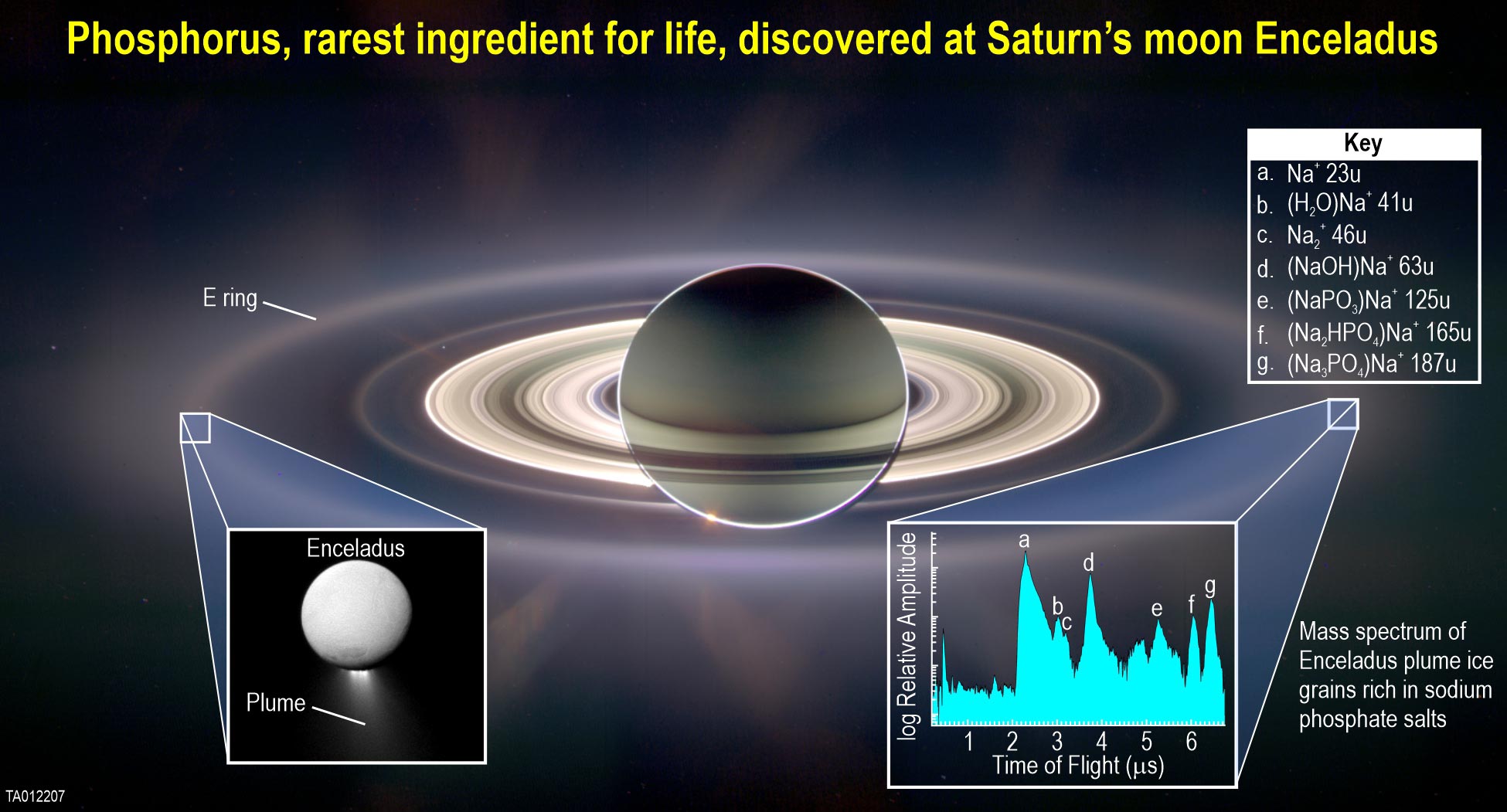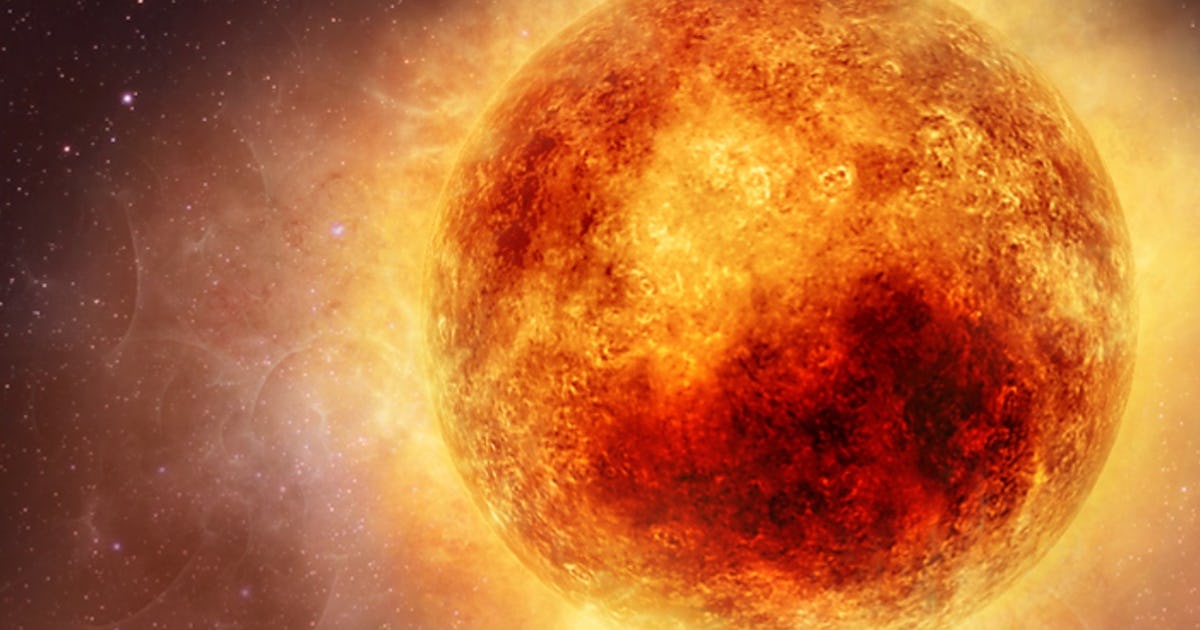Le scientifique principal du SwRI, le Dr Christopher Glenn, faisait partie d’une équipe qui a découvert le phosphore, un élément essentiel de la vie, dans l’océan souterrain de la petite lune de Saturne, Encelade. De l’eau liquide jaillit de l’océan souterrain de la lune, créant un panache contenant des grains d’eau océanique gelée. Certains de ces grains de glace continuent de former l’anneau E de Saturne. L’équipe a analysé les données du vaisseau spatial Cassini à partir de grains de glace dans l’anneau E, qui ont révélé des empreintes de sels de phosphate solubles provenant de l’environnement d’Encelade. Crédit : équipe d’imagerie Cassini/SSI/JPL/SWRI/Freie Universität Berlin
Le Southwest Research Institute a aidé à trouver des preuves de phosphore dans un océan d’eau liquide sous la surface glacée de la lune.
Les chercheurs, utilisant les données de[{ » attribute= » »>NASA’s Cassini mission, have discovered phosphorus in the form of phosphates, a critical component for life, in the subsurface ocean of Saturn’s moon Enceladus. The phosphorus concentration is at least 100 times higher than Earth’s oceans, making it an exciting discovery in the search for extraterrestrial life. The findings reinforce the idea of the potential habitability of ice-covered ocean worlds across the solar system, beyond surface ocean worlds like Earth.
The search for extraterrestrial life in our solar system just got more exciting. A team of scientists including Southwest Research Institute’s Dr. Christopher Glein has discovered new evidence that the subsurface ocean of Saturn’s moon Enceladus contains a key building block for life. The team directly detected phosphorus in the form of phosphates originating from the moon’s ice-covered global ocean using data from NASA’s Cassini mission. Cassini explored Saturn and its system of rings and moons for over 13 years.
“In 2020 (published in 2022), we used geochemical modeling to predict that phosphorus should be abundant in Enceladus’ ocean,” said Glein, a leading expert in extraterrestrial oceanography. He is a co-author of a paper in the journal Nature describing this research. “Now, we have found abundant phosphorus in plume ice samples spraying out of the subsurface ocean.”
The Cassini spacecraft discovered Enceladus’ subsurface liquid water and analyzed samples in a plume of ice grains and gases erupting into space from cracks in the moon’s icy surface. Analysis of a class of salt-rich ice grains by Cassini’s Cosmic Dust Analyzer showed the presence of sodium phosphates. The team’s observational results, together with laboratory analogue experiments, suggest that phosphorus is readily available in Enceladus’ ocean as phosphates.

Scientists have inferred that a soda or alkaline ocean (containing NaHCO3 and/or Na2CO3) inside of Enceladus interacts geochemically with a rocky core. Geochemical modeling and laboratory experiments indicate that this interaction promotes the dissolution of phosphate minerals, making phosphate (e.g., HPO4-2) readily available to potential life in the ocean. The discovery of phosphates by Cassini strongly supports the paradigm that Enceladus’ ocean is habitable. Credit: Southwest Research Institute
Phosphorus in the form of phosphates is vital for all life on Earth. It is essential for the creation of DNA and RNA, energy-carrying molecules, cell membranes, bones, and teeth in people and animals, and even the sea’s microbiome of plankton. Life as we know it is simply not possible without phosphates.
“We found phosphate concentrations at least 100 times higher in the moon’s plume-forming ocean waters than in Earth’s oceans,” Glein said. “Using a model to predict the presence of phosphate is one thing, but actually finding the evidence for phosphate is incredibly exciting. This is a stunning result for astrobiology and a major step forward in the search for life beyond Earth.”
One of the most profound discoveries in planetary science over the past 25 years is that worlds with oceans beneath a surface layer of ice are common in our solar system. Such worlds include the icy satellites of the giant planets, such as Europa, Titan, and Enceladus, as well as more distant bodies like Pluto. Worlds like Earth with surface oceans must reside within a narrow range of distances from their host stars to maintain the temperatures that support surface liquid water. Interior ocean worlds, however, can occur over a much wider range of distances, greatly expanding the number of habitable worlds likely to exist across the galaxy.
“Geochemical experiments and modeling demonstrate that such high phosphate concentrations result from enhanced phosphate mineral solubility, in Enceladus and possibly other icy ocean worlds in the solar system beyond Jupiter,” Glein said. “With this finding, the ocean of Enceladus is now known to satisfy what is generally considered to be the strictest requirement for life. The next step is clear – we need to go back to Enceladus to see if the habitable ocean is actually inhabited.”
Reference: “Detection of phosphates originating from Enceladus’s ocean” by Frank Postberg, Yasuhito Sekine, Fabian Klenner, Christopher R. Glein, Zenghui Zou, Bernd Abel, Kento Furuya, Jon K. Hillier, Nozair Khawaja, Sascha Kempf, Lenz Noelle, Takuya Saito, Juergen Schmidt, Takazo Shibuya, Ralf Srama and Shuya Tan, 14 June 2023, Nature.
DOI: 10.1038/s41586-023-05987-9
The lead author of the Nature paper is Frank Postberg from the Institut für Geologische Wissenschaften, Freie Universität Berlin, Germany. The research team includes scientists from 10 institutions around the world. Glein was the lead U.S. investigator.




